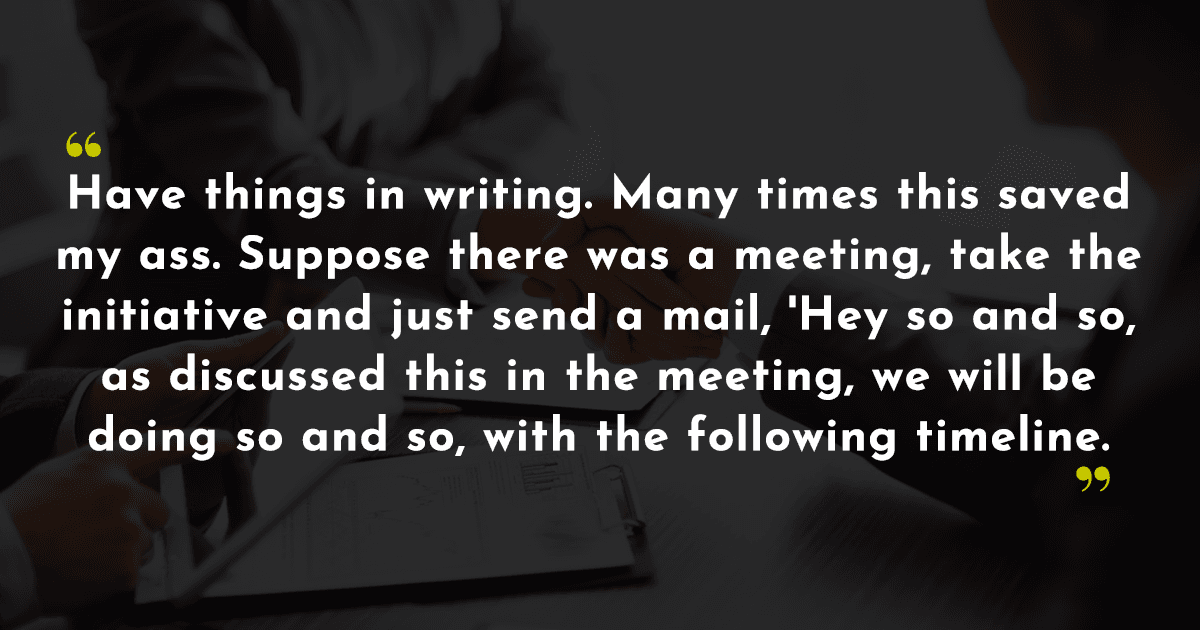For me, negotiating my salary has always been the toughest thing about the interviews. I’m at a loss of words when it comes to that discussion because I never know the right questions to ask without making it awkward.
If you are someone who is worried about their next salary negotiation round, this article will help you with some brilliant tips. Read on.

1. “If you feel the number is too low, don’t decide it on the call with HR. Tell them you’re excited about the position but the compensation is lower than expected, so you need to give it a thought and discuss it with a few people before you can come to a decision. Ask them to have another call sometime next week.” –penguin_chacha

2. “You should have other offers. If the negotiation doesn’t work your way, just ask them to send you an offer letter and walk away. You can use that offer as leverage in another interview.” –penguin_chacha

3. “Don’t put the ball in their court. It’s bad advice borne out of ignorance. Do as much research as possible to understand where the market is and what they potentially pay their current employees. You need to know your worth.” –Unique-Plum

4. “You need to have a range in mind with the minimum you are willing to expect and a target that you want. Then, when they ask, you say something higher than your target but not absurd. This is called anchoring – it anchors them to a value. If you let them say the first number, then you anchor to their value.” –Unique-Plum

5. “You need to have a BATNA (best alternative to a negotiated agreement). It might be a different offer or a current job. But, don’t reveal what your alternative is unless it’s really good. You need to be willing to walk away if the alternative is better or equal than the new offer.” –Unique-Plum

6. “When negotiating, don’t use emotions. If you don’t “feel” your experience and skillset warrant close to, change it to “My research of the market pay range along with my experience and skillset warrant a starting salary of ‘this amount’ of the local market.” Just remember that there is no room for emotions in negotiating and counteroffers when discussing your starting pay or pay raises in the future. They are going to pay you more because of your performance.” –snewton_8

7. “Honestly, say less. You don’t need to give a long explanation about why you want more money and what it would mean for you. Just say that you’re excited about the opportunity, but you would need a salary of ‘this amount’ to make a move from your current job. In these situations, oversharing and overexplaining weaken your bargaining position. Just say what you want and leave the ball in their court. Given the listed range, they probably have it in the budget. They were just trying to lowball you to see if you would take it.” –staffsargent

8. “You have to be able to justify why you deserve that rate. You can use your certifications, skills, and experience to prove you are worth it. You need to be very specific on how these things can help the company to warrant the salary you are asking for.” –jpjdavid83

9. “When moving between companies, know how to map your old compensation to the new one. List every benefit you get from the current company and put a value to it. Then ask the HR of the new company whether they offer it and if they have included it in their “package”. CTC is a really bullshit way of comparing things because HR at most companies don’t understand how some compensation models are built.” –dalitoy

10. “Always pit companies against each other. Some interviews have multiple competitors and later, they fight over who gets you.” –dalitoy

Now that you know all these tips, all the best for your next salary negotiation, folks!

















